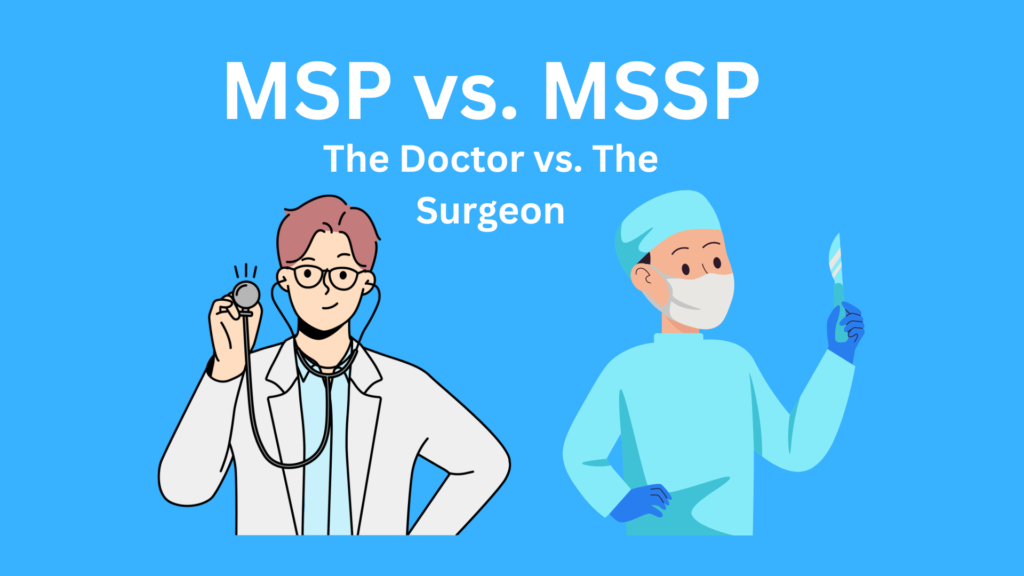
Businesses of all sizes face growing complexities in managing IT infrastructure and protecting against cybersecurity threats. When deciding how to manage these responsibilities, two of the most common options are partnering with a Managed Service Provider (MSP) or a Managed Security Service Provider (MSSP). While these two providers may seem similar at first glance, they serve distinct purposes. So, which one should you choose? What’s the difference between an MSP and MSSP? Let’s dive in to understand how to make the right decision for your business needs.
The Difference Between MSP and MSSP – More than Just IT vs. Security
MSPs act as the IT backbone for organizations. They provide a range of technology services, such as network management, help desk support, hardware provisioning, and software updates. You can think of them as a general doctor—a professional who takes care of your overall IT health, ensuring that your systems run smoothly and your daily needs are addressed.
In contrast, a Managed Security Service Provider (MSSP) is like a medical specialist. While your general doctor can treat minor issues and perform health checkups, there are times when you need a specialist to address a more complex problem—something beyond a routine exam. An MSSP specializes in protecting your business against cybersecurity threats. They focus on proactive threat detection, response, and incident management, making sure your digital assets are protected from advanced and evolving risks.
When to Choose an MSSP Over an MSP
There are scenarios where relying on an MSP alone isn’t enough. Let’s explore when it’s time to bring in an MSSP:
1. When Cybersecurity Threats Become Critical
If your business handles sensitive data—like financial records, customer information, or intellectual property—you need specialized security protection. MSPs can provide baseline security, such as antivirus software and patch management, but they are not equipped to detect and respond to complex cyber threats like an MSSP can. MSSPs are experts in managing advanced security tools, like Security Information and Event Management (SIEM) systems, which help detect unusual activity and mitigate risks.
Let’s look at the doctor scenario again. Imagine an MSP as your general IT “doctor,” providing routine health checks and vaccinations, while an MSSP is the “cardiologist” monitoring for heart issues when your health takes a turn. Without the right specialist, small vulnerabilities can escalate into significant incidents.
2. Regulatory Compliance Needs
Many industries, such as healthcare and finance, have strict compliance requirements regarding data protection. Meeting these regulatory demands is often beyond the scope of an MSP’s expertise. MSSPs have specialized knowledge to help you adhere to regulatory standards like HIPAA, GDPR, or PCI-DSS. They can implement measures such as encryption, security monitoring, and detailed reporting to ensure compliance.
Think of regulatory compliance like adhering to a strict diet and exercise regimen prescribed by a specialist. An MSP might give you some tips, but an MSSP provides a structured plan, monitors your progress, and ensures you meet every benchmark along the way.
3. Around-the-Clock Monitoring and Incident Response
Cyber threats can happen at any time, day or night. An MSSP provides 24/7 security monitoring to identify threats as soon as they occur. If a hacker attempts a data breach at 3 AM, you want someone specialized in monitoring and immediate response to handle the situation. This capability can make the difference between mitigating a minor security event and dealing with a full-blown crisis.
It’s like dialing 911 vs. Calling your doctor’s office. While the general doctor (MSP) might schedule you for a follow-up, the ER is there, ready to respond in an emergency—ensuring you get the immediate care you need.
4. When Your Business Grows and Becomes a Target
As your business scales, it becomes a more attractive target for cybercriminals. An MSP can help with the basic IT needs of a growing business—like adding new users or expanding networks—but an MSSP can fortify your defenses to match your expanding digital footprint. They even identify evolving risk areas so you can grow in a smart way. When you grow, your risks increase, and having a security specialist onboard becomes a necessity.
Think of it as moving from a routine fitness plan to specialized training for a marathon. The stakes are higher, and you need someone who understands the intricacies of your unique challenges.
The Role of a vCISO: Strategic Advisory for Security
Another critical offering from many MSSPs is the virtual Chief Information Security Officer (vCISO) service. A vCISO is an experienced expert who provides strategic cybersecurity leadership specific to your business. This is especially valuable for small and medium-sized enterprises that may not have the resources to hire a full-time CISO but still need expert guidance to manage their security posture.
A vCISO works closely with your leadership team to build a complete security strategy. They help assess risks, prioritize initiatives, and implement policies that align with business goals. Instead of a purely reactive approach to cybersecurity, the vCISO enables proactive planning—focusing on prevention, risk management, and regulatory compliance.
Imagine the vCISO as the specialist who not only treats your health issues but also works with you to create a health plan that prevents problems in the future. Their advisory role helps you understand the potential threats to your business and how to mitigate them before they become a problem. This proactive approach can save businesses significant costs in the long run and improve overall resilience against cyber threats.
Where MSPs and MSSPs Overlap
It’s worth noting that MSPs and MSSPs don’t have to be mutually exclusive. In many cases, businesses benefit from working with both. MSPs ensure your IT operations are running efficiently, while MSSPs provide a crucial layer of security. It’s similar to having a family doctor and a specialist—each plays a role in keeping you healthy, with the generalist managing day-to-day well-being and the specialist focusing on preventing and addressing critical issues.
Should you choose an MSP, MSSP, or both?
Ultimately, deciding between an MSP and an MSSP boils down to understanding your business needs:
- For General IT Support: If your primary need is ensuring your IT infrastructure is stable and operational, and your security needs are minimal, an MSP might be enough.
- For Specialized Security Needs: If your business is handling sensitive data, requires regulatory compliance, or has specific security concerns, partnering with an MSSP becomes essential.
- For Strategic Cybersecurity Guidance: If your business needs to align its security initiatives with broader business objectives, engaging a vCISO through an MSSP can provide the expert advisory needed without the cost of a full-time executive.
Many companies find that they need both—an MSP for day-to-day IT management and an MSSP to keep their data safe and secure.
Make an informed choice
Choosing between an MSP and an MSSP is not just about understanding their differences; it’s about knowing your business and assessing your needs at different stages. If your IT needs are basic and you just need general upkeep, an MSP might be your best choice. But if you face complex security challenges, have compliance requirements, or simply want peace of mind in a world where cyber threats are on the rise, an MSSP is the specialist you need by your side.
Just like seeing a general doctor for routine health checks and a cardiologist for heart care, combining the services of an MSP and MSSP ensures both your IT operations and cybersecurity are in good hands. And if your business requires strategic cybersecurity leadership, a vCISO can be the trusted advisor guiding you to keep your business resilient and secure. With the right combination, your business can stay protected, grow confidently, and be ready for whatever the future may bring.
